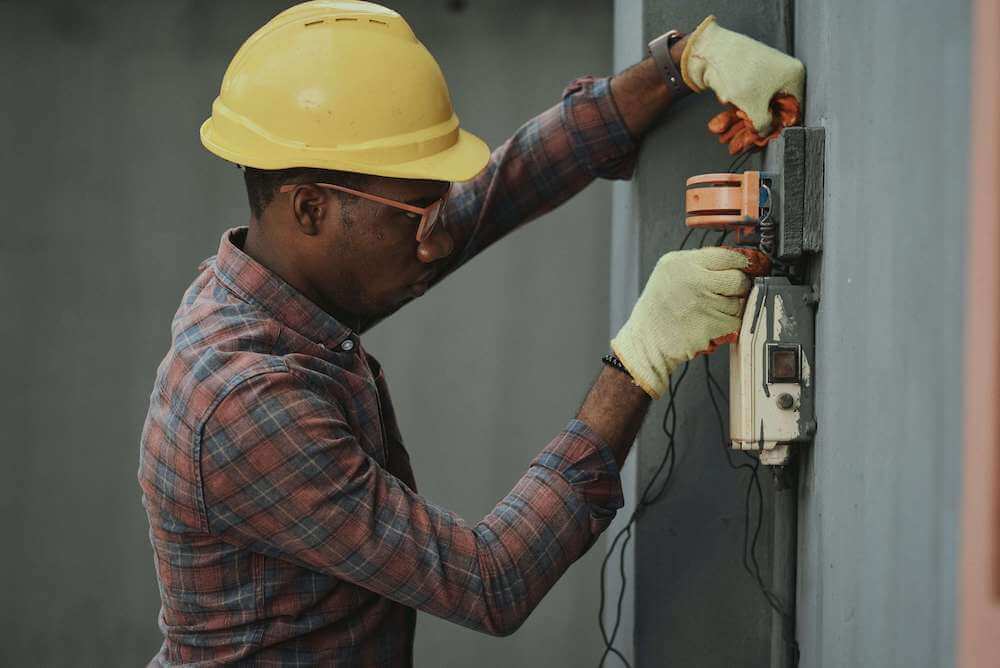
Financial aid (may be available)

Financial aid (may be available)

Financial aid (may be available)

No cost info

Financial aid (may be available)

No cost info

No cost info
No cost info
The main focus for Electricians is to install, repair and maintain electrical power, lighting, communications and control systems in businesses, homes and factories. Our online electrician trade classes begins with the basics of communication, bidding, records and ethics. Then moves on to the career focused subjects of safety for Electricians, electrical circuits, the National Electric Code® and much more.
$1,239 total
Licensed electricians are skilled professionals that fulfill a vital role, and the opportunities for growth and success are virtually limitless. And although the education and training process takes some time and effort, there’s no doubt that it’s absolutely worth it.
Here’s more good news: now, there are more options than ever to make electrician training as accessible and convenient as possible. As a result, you can find many ways to fit the required courses into your schedule. Independent Electrical Contractors Rocky Mountain (IECRM) offers online classes for electrician training, so you can take the first steps toward your future career without even leaving your home.
No cost info
Electrical work has some of the best opportunities for career stability, especially for residential technicians. If you want to start a career in electrical work, this 100% online course will prepare you for an entry-level residential electrician apprenticeship.
No cost info
Our Online Electrician Training courses align with the National Electric Code (NEC) to help you develop the safe, electrician skills employers demand. That includes electrical equipment installation and tool usage, basic electricity and AC current theory, and a wide range of installation procedures for both residential and commercial properties.
No cost info
Columbus, Ohio, is a thriving city with a promising job market for aspiring electricians. The city's growing economy and ongoing infrastructure projects have created a high demand for skilled electrical professionals. If you're interested in becoming an electrician, there are several electrician schools near you in Columbus that can help you achieve your career goals. With the right training, you can earn a competitive electrician salary and become a valuable asset to the city's workforce.

An electrician is a skilled tradesperson responsible for the installation, maintenance, and repair of electrical systems and components. They work in a wide range of settings, including residential, commercial, and industrial settings, ensuring that electrical systems are functioning safely and efficiently. Electricians are responsible for tasks such as wiring, troubleshooting, and upgrading electrical systems, as well as adhering to local and national electrical codes.
To become an electrician in Columbus, you'll need to complete a combination of classroom instruction and hands-on training. This typically involves enrolling in an electrician apprenticeship program or attending a vocational school or community college that offers an electrician training program.
The fastest way to become an electrician in Columbus is to enroll in a vocational or technical school that offers an electrician training program. These programs typically take between 6 months to 2 years to complete, depending on the specific program and the level of certification you're seeking.
There are several options for electrician classes in Columbus, each with its own unique features and requirements. Here are a few examples:
Columbus State Community College offers an Associate of Applied Science (AAS) degree in Electrical Trades Technology. This 2-year program provides a comprehensive education in electrical theory, installation, and maintenance, as well as hands-on training in the lab. The program includes courses in electrical wiring, motor control, programmable logic controllers, and more. Tuition for the program is approximately $4,500 per year for in-state students.
Ohio Technical College in Columbus offers a 9-month Electrical/Electronics program that prepares students for a career as an electrician. The program covers topics such as electrical theory, residential wiring, commercial wiring, and industrial motor controls. Tuition for the program is approximately $18,000.
The International Brotherhood of Electrical Workers (IBEW) Local 683 in Columbus offers a 5-year apprenticeship program that combines on-the-job training with classroom instruction. Apprentices earn a wage while they learn, and upon completion of the program, they are eligible to become journeyman electricians. The program is tuition-free, and apprentices are responsible for the cost of books and materials.
While there are no fully online electrician programs available in Columbus, some schools do offer hybrid or blended learning options that combine online coursework with hands-on training. Additionally, there are no free electrician training programs in the city, as most programs require tuition or an apprenticeship fee.
To become a licensed electrician in Columbus, you'll need to complete an apprenticeship program or vocational training program and pass the required exams. In Ohio, electricians are required to obtain a license from the Ohio Construction Industry Licensing Board (OCILB). The licensing process involves passing a written exam and demonstrating practical skills.
The job market for electricians in Columbus is strong, with a variety of potential employers in the city. Some of the largest employers of electricians in Columbus include construction companies, manufacturing facilities, commercial and residential property management firms, and the city's public utilities department. According to the Bureau of Labor Statistics, the average electrician salary in Columbus is $60,240 per year, which is slightly higher than the national average.
If you're interested in becoming an electrician in Columbus, there are several excellent electrician schools near you that can provide the training and education you need to succeed in this rewarding career. With the city's growing economy and ongoing infrastructure projects, the demand for skilled electrical professionals is expected to remain high. By enrolling in an electrician training program and obtaining the necessary certifications, you can position yourself for a fulfilling and well-paid career as an electrician in Columbus.
Looking for a better fit? These other articles could be more in line with your expectations if this one isn't precisely what you had in mind:
Dreambound's platform allows prospective students to find the right educational program for them through searching, filtering, and connecting with our extensive selection of career & technical education partners.
Dreambound has over 70 programs across healthcare, technology, business, and industrial trades. This includes programs such as Medical Billing, Cybersecurity, and welding.
Some of our schools offer financial aid for those who qualify. Many others offer payment plans, where you can pay the cost of class over time.
Yes, Dreambound offers many online programs. On Dreambound's search, you can filter by online, in-person, and hybrid (part online, part in-person).
Dreambound is completely free for you to use! We are supported by schools and organizations who pay to advertise on our website, so we can offer all of our career resources for free.